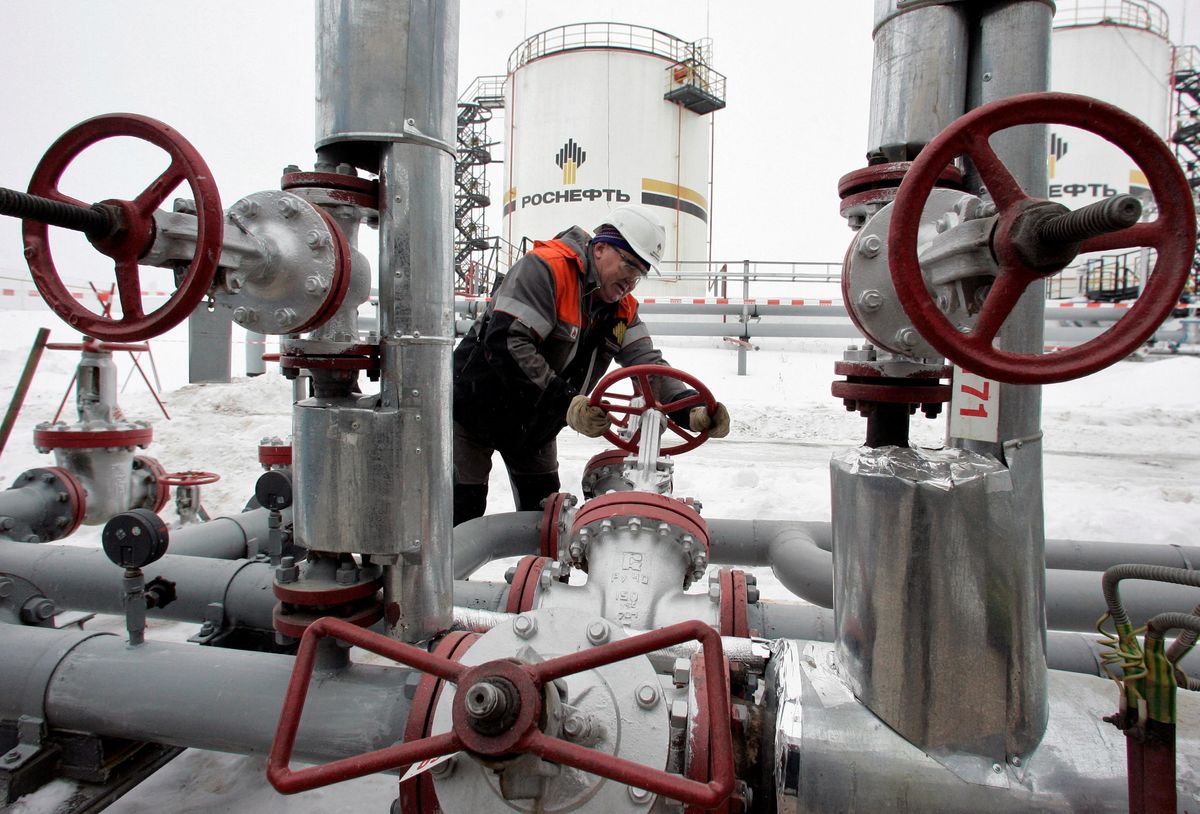Russia’s invasion of Ukraine has prompted fears of a disruption of oil and gas supplies to Europe, sending prices to new highs. Brent crude futures reached $105 per barrel in the immediate aftermath of the news before falling back; European natural gas prices jumped by as much as 25%.
Coming at a time of already tight supplies, the conflict is bound to maintain upward pressure on prices, unless it becomes clear that Russian exports will not be interrupted. The impact will be felt directly by US consumers and others, and it will contribute further to already-high inflation.
Escalating tension over Ukraine had pushed prices up even before the invasion. Fears that Russian natural gas exports through Ukraine were at risk had been an important factor driving record-high prices in Europe, which relies on Russia for over 40% of its natural gas imports. Ukraine had less impact on oil prices, but with demand growth outstripping the increases in supply, markets are wary.
Still, the Russian invasion of Ukraine has not (yet) led to an immediate interruption of oil or natural gas supplies. Trade in Russian oil slowed temporarily in anticipation of US and EU sanctions, but given that the initial US and EU measures put in place did not target energy, crude sales are likely to return to normal.
Natural gas supplies are more vulnerable given that about 20% of Russian gas exports outside of former Soviet Union countries flow through Ukraine. The risk of damage to pipelines will grow as the fighting escalates, and Russia may seek to deny Ukraine transit fees by declaring force majeure to remove Russian liability over gas shipments through this route. Such a move by Russia would have the additional benefit of hitting EU finances as well by raising the cost of alternative supplies to the bloc.
In the longer term, the risk to energy supplies will depend on two factors.
The first is whether tighter sanctions are imposed by the US and the EU. Deeper and wider sanctions are certainly possible, especially if Russia seeks to occupy all or parts of Ukraine. US and EU officials insisted in the run-up to the invasion that they would seek to avoid measures that directly target Russian energy flows, not least because of the damage to their own economies.
But the tougher the financial sanctions that are imposed and the greater the number of Russian banks targeted, the greater the risk that Western companies will balk at conducting business with these financial institutions. This hesitancy could derail transactions in the energy sector and others. At the very least, having to comply with sanctions will make Western banks more reticent to deal with their Russian counterparts.
Oil transactions will probably be affected first, as this trade is largely short-term. But, over time, long-term gas contracts will also be affected.
The second factor is whether Russia retaliates against sanctions by deploying its own "energy weapon”: cutting off oil and gas exports to Europe. It has not threatened such measures so far; on the contrary, Russia’s government and companies were at pains to emphasize their reliability as energy suppliers immediately prior to the invasion, and have raised natural gas flows in the aftermath of military operations. Reversing course now would destroy their credibility in the markets and bring huge financial and commercial costs.
Energy is a major source of revenue for the Kremlin, with oil and natural gas making up 40% of its budget receipts. For big companies such as Gazprom, breaking long-term contracts with the EU risks major legal liability and would further accelerate the bloc's moves to decouple from its dependence on Russian gas.
On the oil side, interrupting physical supplies would force Russian companies to cede market share. If that happens, other producers — particularly OPEC leaders such as Saudi Arabia — would face increasing pressure to use their own spare capacity to fill the gap in Russian supplies.
Nevertheless, the invasion of Ukraine demonstrates that Russian President Vladimir Putin is willing to take large gambles. Therefore, the possibility of a full suspension of oil and natural gas exports to the EU cannot be dismissed. If it does happen, the impact would be devastating, not just to those European economies dependent on Russian imports, but to the wider global economy as well.
Cutting off all natural gas exports to Europe would lead to massive power shortages and sky-high prices that would drive the EU and UK economies into long-term recessions. Meanwhile, a suspension of Russian oil exports to Europe would immediately drive global prices well above $100 per barrel, and spur more global inflation.
It would be a pyrrhic victory victory at best for Russia, given the likely long-term strategic and energy blowback. But in his current mood, Putin may not care.
Raad Alkadiri is managing director for Energy, Climate & Resources at Eurasia Group.
- US ban on Russian oil imports not coordinated with NATO allies - GZERO Media ›
- Rising gas prices will test US resolve on Russian sanctions - GZERO Media ›
- European small biz owners impacted by Ukraine war and COVID, says head of industry group - GZERO Media ›
- EU/NATO summits intensify support for Ukraine - GZERO Media ›
- Kerry: Putin has bigger problems than Ukraine - GZERO Media ›
- 6 months of Russia's war in Ukraine - GZERO Media ›
- Kerry: Putin has bigger problems than Ukraine - GZERO Media ›
- Europe's energy future: Perspective from Norway's PM Jonas Støre - GZERO Media ›





